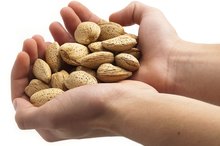What does fact checked mean?
At Healthfully, we strive to deliver objective content that is accurate and up-to-date. Our team periodically reviews articles in order to ensure content quality. The sources cited below consist of evidence from peer-reviewed journals, prominent medical organizations, academic associations, and government data.
- "Texas Heart Institute Journal"; C-Reactive Protein, Inflammation, and Cardiovascular Disease - Clinical Update; Paul M. Ridker, M.D., M.P.H., F.A.C.C.; 2005
- "Texas Heart Institute Journal"; C-Reactive Protein, Inflammation, and Cardiovascular Disease - Clinical Update; Paul M. Ridker, M.D., M.P.H., F.A.C.C.; 2005
- "Free Radical Biology and Medicine"; Vitamin C Treatment Reduces Elevated C-Reactive Protein; G. Block, et al.; January 2009
- "Free Radical Biology and Medicine"; Vitamin C Treatment Reduces Elevated C-Reactive Protein; G. Block, et al.; January 2009
The information contained on this site is for informational purposes only, and should not be used as a substitute for the advice of a professional health care provider. Please check with the appropriate physician regarding health questions and concerns. Although we strive to deliver accurate and up-to-date information, no guarantee to that effect is made.
Recent research links inflammation to a host of serious and chronic health threats, including insulin resistance, type 2 diabetes, arthritis, cancer and cardiovascular disease. Cranberry juice contains several nutrients that show promise in the treatment of inflammation, including vitamin C, vitamin E and magnesium. Speak to your doctor or healthcare provider about the benefits of cranberry juice for inflammation.
Cytokines
Cytokines are inflammatory proteins that the body releases in response to the chronic low-grade, body-wide inflammation often associated with obesity; over time, the chronic inflammation damages vital organs. The cytokines involved in inflammation include tumor necrosis factor-alpha, interleukin-1 and interleukin-6, and C-reactive protein. C-reactive protein is the inflammatory marker that indicates the highest risk of cardiovascular problems, according to a report published in the "Annual Review of Nutrition" in July 2005 1.
Vitamin C
Almonds: Nutrition & Inflammation
Learn More
Cranberry juice is an excellent source of vitamin C; 1 cup of unsweetened cranberry juice contains 24 mg of vitamin C, over 30 percent of the recommended daily allowance for adults. Vitamin C demonstrates the ability to lower levels of inflammatory proteins, particularly C-reactive protein. Researchers at the University of California, Berkeley studied the effects of vitamin C supplementation on a group of nonsmokers with elevated C-reactive protein levels. After two months, the vitamin C successfully lowered the C-reactive protein readings in the subjects by 25.3 percent. The results of this study were published in the January 2009 issue of the journal “Free Radical Biology and Medicine. 3”
- Cranberry juice is an excellent source of vitamin C; 1 cup of unsweetened cranberry juice contains 24 mg of vitamin C, over 30 percent of the recommended daily allowance for adults.
- Researchers at the University of California, Berkeley studied the effects of vitamin C supplementation on a group of nonsmokers with elevated C-reactive protein levels.
Vitamin E
Cranberry juice contains the form of vitamin E known as alpha-tocopherol, which research demonstrates can reduce inflammation. A study conducted by researchers at the University of California Davis Medical Center and published in the “Annual Review of Nutrition” in July 2005 discovered that vitamin E significantly lowered levels of pro-inflammatory cytokines in patients with cardiovascular disease, as well as those at risk of developing cardiovascular disease 2.
Magnesium
Lemons & Pancreatitis
Learn More
Cranberry juice also contains a good amount of the mineral magnesium; 1 cup provides 5 percent of the recommended daily allowance of magnesium for adults. In recent years, magnesium deficiency emerged as a risk factor for inflammation. A study conducted by researchers at the Medical University of South Carolina and published in the “Journal of the American College of Nutrition” in June 2005 surveyed a group of adults who were not taking magnesium supplements. The researchers found that the subjects who consumed less magnesium had the highest levels of C-reactive protein.
- Cranberry juice also contains a good amount of the mineral magnesium; 1 cup provides 5 percent of the recommended daily allowance of magnesium for adults.
Related Articles
References
- "Texas Heart Institute Journal"; C-Reactive Protein, Inflammation, and Cardiovascular Disease - Clinical Update; Paul M. Ridker, M.D., M.P.H., F.A.C.C.; 2005
- "Annual Review of Nutrition"; Vitamin E, Oxidative Stress and Inflammation; U. Singh, et al.; July 2005
- "Free Radical Biology and Medicine"; Vitamin C Treatment Reduces Elevated C-Reactive Protein; G. Block, et al.; January 2009
Writer Bio
Emma Cale has been writing professionally since 2000. Her work has appeared in “NOW Magazine,” “HOUR Magazine” and the “Globe and Mail.” Cale holds a Bachelor of Arts in English from the University of Windsor and advanced writing certificates from the Canadian Film Centre and the National Theatre School of Canada.









